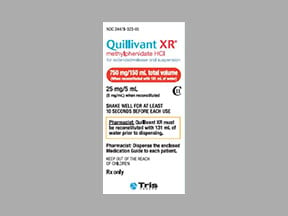
Quillivant Xr Coupons & Savings Card – Discount Prices from $283.08
My prescription
Edit
120ML of 25MG/5ML, Quillivant Xr (1 Bottle)
Select pharmacy

CVS
$358.31
COUPON PRICE
Albertsons
$283.08
COUPON PRICE
Walgreens
$283.08
COUPON PRICE
Walmart
$288.95
COUPON PRICEQuillivant Xr savings card
Show this card to your pharmacist
Albertsons
$283.08
BIN
ID
PCN
GRP
011867
LH0CF626E8
HT
LABH001
Powered by
More prescriptions for adhd
More prescriptions for adhd
Price history for Quillivant Xr
1 Bottle, 120ML of 25MG/5ML
Average retail price for Quillivant Xr
Average SaveHealth price for Quillivant Xr
Our price history data is based on aggregated prescription data collected from participating pharmacies in America. Our prescription data updates daily to reflect the latest price changes. If you notice a missing data point, it means there wasn't sufficient data available to generate a monetary value for that date.
*Retail prices are based on pharmacy claims data, and may not be accurate when we don't have enough claims.
Quillivant Xr dosage forms
Dosage Quantity Price from Per unit 120ML of 25MG/5ML 1 Bottle $339.21 $339.21 120ML of 25MG/5ML 2 Bottles $663.41 $331.70 120ML of 25MG/5ML 3 Bottles $987.62 $329.21
| Dosage | Quantity | Price from | Per unit |
|---|---|---|---|
| 120ML of 25MG/5ML | 1 Bottle | $339.21 | $339.21 |
| 120ML of 25MG/5ML | 2 Bottles | $663.41 | $331.70 |
| 120ML of 25MG/5ML | 3 Bottles | $987.62 | $329.21 |
Is Quillivant XR the same as Adderall?
Quillivant XR and Adderall are not the same. Quillivant XR is an extended-release liquid formulation of methylphenidate, while Adderall is a combination of amphetamine salts. Both are used to treat attention deficit hyperactivity disorder (ADHD), but they contain different active ingredients and may have different effects and side effects.
Is Quillivant XR safe for kids?
Quillivant XR is a medication that is approved for use in children aged 6 years and older for the treatment of attention deficit hyperactivity disorder (ADHD). However, as with any medication, it is important for a healthcare provider to evaluate the child's health history and current condition to determine if it is appropriate and safe for them. Parents or guardians should discuss any concerns or questions with the child's doctor to ensure the best treatment plan.
Is Quillivant XR the same as Ritalin?
Quillivant XR and Ritalin are not the same, but they are both medications used to treat attention deficit hyperactivity disorder (ADHD). They contain the same active ingredient, methylphenidate, but differ in their formulation and release mechanism. Quillivant XR is an extended-release liquid suspension, while Ritalin is available in immediate-release tablet form.
Is Quillivant the same as Concerta?
Quillivant and Concerta are not the same, although both are medications used to treat attention deficit hyperactivity disorder (ADHD). They contain different formulations of the active ingredient methylphenidate. Quillivant is a liquid suspension, while Concerta is an extended-release tablet.
What are the long term effects of Quillivant XR?
Long-term use of Quillivant XR, which is a medication containing methylphenidate, may lead to several potential effects. These can include decreased appetite, weight loss, and potential growth suppression in children. There may also be an increased risk of cardiovascular issues, such as elevated blood pressure and heart rate. Additionally, some individuals may experience mood changes, anxiety, or other psychiatric symptoms. It is important for patients to have regular follow-ups with their healthcare provider to monitor for these effects and adjust treatment as necessary.
